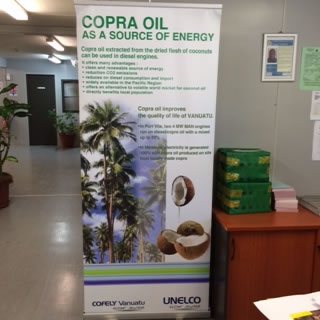In the run-up to shedding "least developed country" status in 2017, the Pacific island nation of Vanuatu is working with UNCTAD to revisit their trade policy and develop a national action plan to boost production and export coconut oil, single origin organic cocoa and high quality sandalwood oil, among other "green" products.
 Copra is the dried kernel, of the coconut used to extract coconut oil. |
Diagnosing the potential and improving the competiveness of each of these sectors was discussed at a two-day workshop, sponsored by UNCTAD and the Ministry of Trade, Tourism, Commerce and Industry, in Port Vila, Vanuatu, on 27-28 August.
The workshop kicked-off a yearlong National Green Export Review (NGER) process in which UNCTAD will work in a close partnership with Vanuatu to improve links between tourism and other sectors in order to take greater advantage of sales of "green" goods.
UNCTAD Secretary-General Mukhisa Kituyi addressed the closing session of the seminar on 28 August, citing the example of local partnerships and business linkages that UNCTAD recently helped foster in Tanzania and Laos between organic farmers and the tourism industry, which help these countries move up the value-chain and benefit from growing trade in services. Vanuatu, he said, can facilitate similar business linkages and promote local products and livelihoods in partnership with the island nation's hotels.
In addition to the need to facilitate business linkages, the seminar also highlighted two other important industries, which Vanuatu can help nurture. Technological advances now mean that coconut oil is increasingly used to replace diesel fuel, improving energy efficiency and sustainability. can be done through expanding the supply side capacity of copra production in Vanuatu, an essential input for the generation of coconut oil.
Start-ups have also been set up in the cocoa industry. They are already producing cocoa nibs and will soon start producing single origin artisanal chocolate for tourists, who visit the Pacific island nation.
During his visit, Secretary-General Kituyi also met with the Prime Minister of Vanuatu, H.E. Mr. Joe Natuman, to discuss the challenges and opportunities presented by the country's forthcoming graduation from the "least developed country" (LDC) category in 2017. Currently categorized by the United Nations as an LDC, entitling it to aid, preferential market access and special technical assistance among other concessions, Vanuatu is set to shed this status in December 2017.
Vanuatu, like most other Pacific island countries and all small-island developing states (SIDS), struggles with island-specific difficulties in international trade, including lack of economies of scale, and higher vulnerability to economic shocks and natural disasters.
The Prime Minister and Secretary-General Kituyi discussed the specific concerns that small island developing states face as they prepare for LDC graduation. In particular, countries like Vanuatu are concerned about the possibility they may experience decreased official development assistance, and they are eager to create an environment favorable to improved trade prospects.
UNCTAD plans to continue its technical assistance and advisory services to Vanuatu in much the same way it did for Cabo Verde (2004-2007) and the Maldives (2004-2010) when these small island nations also graduated from the LDC category. In this regard, Dr. Kituyi pointed at the need to develop multilateral and regional incentives that favour the transition toward graduation in order to ensure that the new phase in which countries like Vanuatu are entering is sustainable. He also reassured of UNCTAD's continued engagement with Vanuatu and Pacific SIDS.
In addition to the Prime Minister, Dr. Kituyi met with the Deputy Prime Minister, H.E. Mr. Ham Lini who serves as the Minister of Trade. He reaffirmed UNCTAD's commitment to the speedy completion of the NGER process.
Discussions were also held with the Minister of Foreign Affairs and Former Prime Minister, H.E. Sato Kilman on SIDS vulnerability and regional development initiatives. Additionally, he visited the Melanesian Spearhead Group Secretariat and lauded their initiatives toward Melanesian joint action.
Dr. Kituyi will travel from Vanuatu to Samoa to attend a major United Nations conference on the problems faced by SIDS, including climate change, held in Samoa on 1-4 September.



